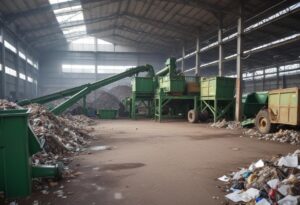Green Certifications: A Game Changer for Indian Businesses?
Green Certifications: A Game Changer for Indian Businesses?
In today’s environmentally conscious world, consumers are increasingly making purchasing decisions based on sustainability. This shift in consumer behavior has placed a spotlight on businesses and their environmental practices. Green certifications, which verify a company’s commitment to environmental responsibility, are emerging as a game changer for Indian businesses, offering a competitive edge and unlocking new market opportunities. This article explores the current landscape of green certifications in India, analyzes their potential benefits and drawbacks for businesses, and examines whether they can truly transform the Indian business landscape.
The Rise of Green Consciousness
A growing number of Indian consumers are prioritizing eco-friendly products and services. According to a Nielsen survey, 68% of Indian consumers are willing to pay a premium for sustainable brands [1]. This trend is driven by factors like rising awareness of climate change, pollution concerns, and a desire for healthier living. Businesses that can demonstrate their environmental commitment through credible certifications are well-positioned to attract this growing segment of environmentally conscious consumers.
Understanding Green Certifications
Green certifications are awarded by independent bodies that assess a company’s environmental performance against specific criteria. These criteria can encompass aspects like energy efficiency, waste management, water conservation, use of sustainable materials, and pollution reduction.
A Diverse Landscape of Certifications:
India offers a diverse range of green certifications catering to various sectors. Some prominent examples include:
LEED (Leadership in Energy and Environmental Design): A globally recognized green building rating system that focuses on energy efficiency, water conservation, and sustainable construction practices.
IGBC Green (Indian Green Building Council): The Indian adaptation of LEED, specifically catering to the local context.
BEES (Bureau of Energy Efficiency Star): A label awarded to appliances based on their energy efficiency.
Ecomark India: A government-backed certification program that recognizes products with a lower environmental impact throughout their life cycle.
Organic India: A certification for organically produced food and agricultural products, ensuring responsible farming practices.
Benefits of Green Certifications:
Green certifications offer a multitude of benefits for Indian businesses:
Market Differentiation: In a crowded marketplace, green certifications differentiate a company as environmentally responsible, attracting eco-conscious consumers and potential partners.
Enhanced Brand Image: Certifications translate to positive brand perception, fostering trust and loyalty among customers.
Cost Savings: Implementing green practices often leads to reduced resource consumption, translating to lower energy and water bills.
Access to New Markets: Certain green certifications can unlock access to international markets where sustainability standards are stringent.
Improved Operational Efficiency: The certification process often involves a comprehensive review of operations, leading to identification of areas for improvement and enhanced efficiency.
Challenges and Considerations:
While promising, green certifications come with their own set of challenges:
Cost of Certification: The costs associated with certification audits and ongoing maintenance can be a deterrent for small and medium-sized enterprises (SMEs).
Complexity of Process: The certification process can be complex and time-consuming, requiring dedicated resources and expertise.
Greenwashing Concerns: There is a risk of “greenwashing,” where companies exploit green certifications for marketing purposes without genuinely implementing sustainable practices.
Limited Awareness: Awareness of green certifications among consumers and businesses in India is still evolving.
The Way Forward: A Sustainable Transformation
For green certifications to become a true game changer for Indian businesses, several factors need to be addressed:
Government Support: Government initiatives like financial incentives, streamlined certification processes, and awareness campaigns can encourage wider adoption.
Focus on Sustainability: The emphasis should shift from mere certification to genuine implementation of sustainable practices within businesses.
Building Capacity: Developing a skilled workforce with expertise in green practices and certification processes is crucial for successful implementation.
Consumer Education: Raising public awareness about the significance of green certifications will empower consumers to make informed choices.
Conclusion: A Catalyst for Change
Green certifications offer a powerful tool for Indian businesses to embrace sustainability and navigate the ever-evolving market landscape. While there are challenges to overcome, the potential benefits of enhanced competitiveness, improved brand image, and access to new markets are significant. By prioritizing genuine environmental commitments, streamlining the certification process, and fostering consumer awareness, India can unlock the true potential of green certifications and pave the way for a more sustainable future. Green certifications can act as a catalyst for change, transforming Indian businesses into responsible environmental stewards and propelling India towards a greener and more sustainable economy.
Real-World Examples: Indian Businesses Winning with Green Certifications
Green certifications are not just badges of honor; they are translating into tangible business success for Indian companies across various sectors. Here are a few inspiring examples:
ITC’s Paperboards & Specialty Papers Division: This division of ITC, a leading Indian conglomerate, boasts LEED Platinum certification for several of its manufacturing facilities. This commitment to green practices has not only reduced their environmental footprint but also yielded significant cost savings through energy and water conservation. Additionally, the green certifications have enhanced their brand image, attracting environmentally conscious customers and strengthening their position in the global market.
Godrej Appliances: A pioneer in sustainable home appliances, Godrej has leveraged certifications like BEE Star ratings to differentiate its products. Their focus on energy-efficient appliances resonates with consumers seeking eco-friendly choices, contributing to their market leadership in the segment. The green certifications have also positioned Godrej as a responsible manufacturer, attracting environmentally conscious investors and partners.
The Indian Hotels Company (IHCL), Taj Hotels: Recognizing the growing demand for sustainable hospitality experiences, IHCL has implemented green initiatives across its Taj hotel chain. Many Taj properties hold certifications like LEED or IGBC Green, showcasing their commitment to water conservation, energy efficiency, and responsible waste management. This focus on sustainability has attracted eco-conscious travelers and contributed to a positive brand image for Taj Hotels.
Selco India: This social enterprise empowers rural communities with access to clean energy solutions. Their solar lighting products are certified under MNRE’s (Ministry of New and Renewable Energy) Surya Labelling program, ensuring quality and performance. This certification builds trust with customers and facilitates wider adoption of their solar solutions, contributing to their social impact and business success.
Fabindia: This renowned Indian brand known for its ethically sourced and handcrafted products has embraced organic certification for its textile and food products. The Organic India certification assures customers of the responsible farming practices used in their products, attracting a loyal clientele who value sustainability and ethical sourcing. This focus on organic certification has not only strengthened their brand identity but also opened doors to new markets with stringent sustainability standards.
These examples demonstrate how green certifications can be a powerful tool for Indian businesses. By genuinely integrating sustainability practices and leveraging credible certifications, Indian companies can achieve success while contributing to a greener future.
- Fur-Ever Friends Boutique: Tail-Wagging Treasures
- Critter Comforts and Beyond: Exploring the Expansive World of Pet Shops
- Paws, Claws, and Beyond: Navigating the Vast Realm of Pet Store Wonders




